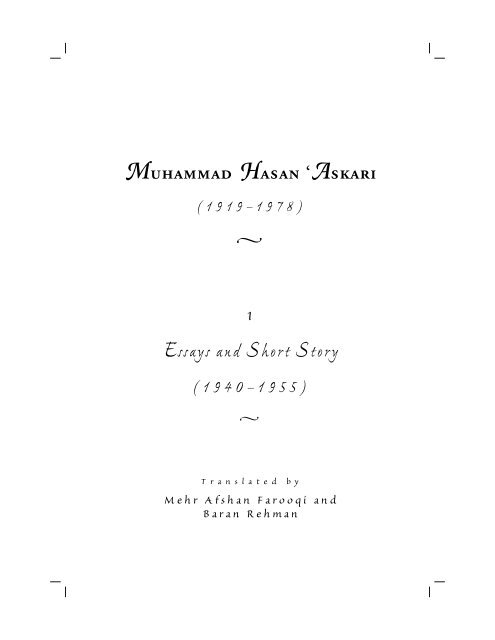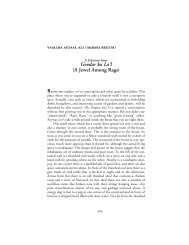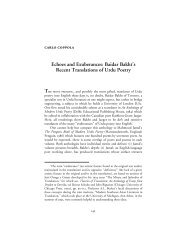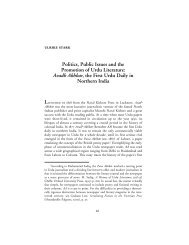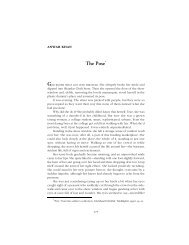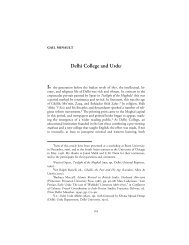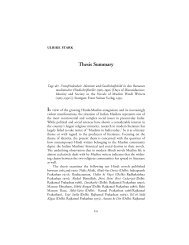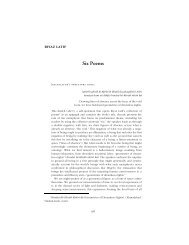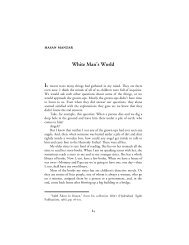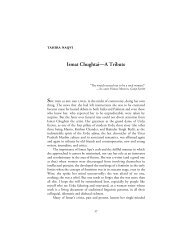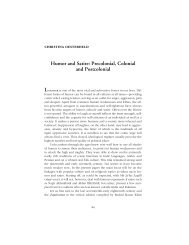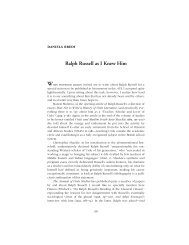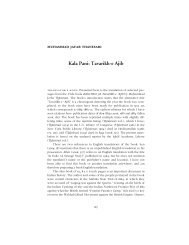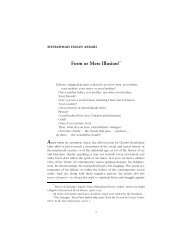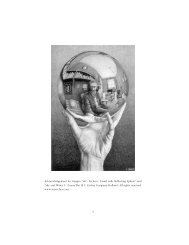MuHAmmAD HASAN 'ASkARi - the Annual of Urdu Studies
MuHAmmAD HASAN 'ASkARi - the Annual of Urdu Studies
MuHAmmAD HASAN 'ASkARi - the Annual of Urdu Studies
You also want an ePaper? Increase the reach of your titles
YUMPU automatically turns print PDFs into web optimized ePapers that Google loves.
MUHAMMAD <strong>HASAN</strong> ‘ASKARI(1919–1978)1Essays and S hort S tory(1940–1955)T r a n s l a t e d b yMehr Afshan Farooqi andBaran Rehman
MEHR AFSHAN FAROOQITowards a Prose <strong>of</strong> Ideas:An Introduction to <strong>the</strong> Critical Thought <strong>of</strong>Muhammad Hasan ‘AskariWe haven’t yet in fact produced a prose<strong>of</strong> ideas to create a prose genre forexpressing critical thought.—MUHAMMAD <strong>HASAN</strong> ‘ASKARI1URDU SCHOLARS are united in <strong>the</strong> opinion that modern <strong>Urdu</strong> literaturebegan in <strong>the</strong> latter part <strong>of</strong> <strong>the</strong> nineteenth century when such intellectualgiants as Alπ≥f ƒusain ƒ≥lµ, Shiblµ Nu‘m≥nµ, Sir Sayyid Ahmad Khan, andMu√ammad ƒusain ¥z≥d elected to write literary and cultural criticism,and that it fur<strong>the</strong>r evolved at <strong>the</strong> hands <strong>of</strong> o<strong>the</strong>rs, notably Iqb≥l andseveral writers identified with <strong>the</strong> Progressive Writers’ Movement(PWM). Their contributions notwithstanding, I intend to discuss here<strong>the</strong> critical and creative writings <strong>of</strong> Mu√ammad ƒasan ‘Askarµ (1919–1978)who presents a strident, <strong>of</strong>ten sarcastic, dissenting opinion on <strong>the</strong> consequences<strong>of</strong> adopting elements <strong>of</strong> Western literary culture in <strong>the</strong> production<strong>of</strong> <strong>Urdu</strong> literature and on attempting to “reform” <strong>Urdu</strong> literaturethrough <strong>the</strong> application <strong>of</strong> political ideology. His remarks are based on athorough knowledge <strong>of</strong> Western literature and a sophisticated understanding<strong>of</strong> cultural relativity. One factor responsible for his omissionfrom <strong>the</strong> wider scholarly discussion <strong>of</strong> modern <strong>Urdu</strong> literature might bethat his work has not been consistently in print and, excluding a few straypieces, has remained largely untranslated in English. Several o<strong>the</strong>r reasonsmight be: after an initial flirtation with <strong>the</strong> PWM, he rejected it, risking a175
MEHR AFSHAN FAROOQI • 177through <strong>the</strong> act <strong>of</strong> translation is, and how problematic it could be toadopt ontological concepts and literary styles from Western sources whenwriting in <strong>Urdu</strong>. A university education had provided him with comparativemethodology, but it failed to enable him to be reflexive. As an IndianMuslim, during <strong>the</strong> run-up to <strong>the</strong> departure <strong>of</strong> <strong>the</strong> British and <strong>the</strong> widespreadconfusion and unease produced by <strong>the</strong> political environmentbrought about by Nehru and Jinnah, he was unable to define or represent<strong>the</strong> “Indian ethos,” or “Indian sensibilities” in his own writing. Forexample, regarding his short story “ƒar≥mj≥dµ,” included in his collectionJazµr® (Islands), ‘Askarµ, having acknowledged Chekhov as his inspiration,confesses in <strong>the</strong> Epilogue to <strong>the</strong> collection that he was constrained to usea Christian character as <strong>the</strong> problematic figure since <strong>the</strong> story was derivative<strong>of</strong> “a seventy-five percent Western consciousness,” and it would betoo much <strong>of</strong> a blow to Indian sensibility to give this main character aHindu or Muslim name. He implies that to “reach <strong>the</strong> depths <strong>of</strong> <strong>the</strong>Indian spirit” <strong>the</strong> writer must scale <strong>the</strong> “walls <strong>of</strong> appearances” with <strong>the</strong>tools <strong>of</strong> “love and humility.” Unabashedly, he admits, “Love perhaps Icould muster, but humility—by which I don’t mean placing myself beloweveryone else, but treating everyone as equal to myself—is something Icannot manage.” 1While he could not achieve, or was unwilling to attempt, a representation<strong>of</strong> <strong>the</strong> “Indian ethos” in his creative writing, ‘Askarµ did succeed, Ithink effectively, in demonstrating how to improve <strong>the</strong> form and style <strong>of</strong>literary <strong>Urdu</strong>. On one or more levels each <strong>of</strong> his stories can serve as ademonstration <strong>of</strong> his intense interest and concern with equalizing if notprivileging form over content (what he calls experience). He believed thathis contemporaries, particularly <strong>the</strong> Progressives, were excessively concernedwith depicting experience and realism, especially from a Western,Marxist point <strong>of</strong> view, but <strong>the</strong>y had largely ignored developing <strong>the</strong> syntaxand word usage <strong>of</strong> <strong>Urdu</strong>. In <strong>the</strong> above-mentioned Epilogue ‘Askarµ confessesto several shortcomings, not <strong>the</strong> least <strong>of</strong> which is his failure to transcendhis isolation from <strong>the</strong> core <strong>of</strong> an Indian ethos. I believe this is one<strong>of</strong> <strong>the</strong> main reasons he ceased writing fiction by 1945.‘Askarµ never married. He was an intensely private person and verylittle is known about his personal life. Photographs <strong>of</strong> him are rare. I wassurprised that none <strong>of</strong> <strong>the</strong> recently published anthologies contains a pic-1 For an expansion <strong>of</strong> <strong>the</strong> above points in ‘Askarµ’s own words, see “Excerptsfrom ‘Askarµ’s Epilogue” in my “Translator’s Note” elsewhere in this issue.
178 • THE ANNUAL OF URDU STUDIESture <strong>of</strong> him. He had a round face and wore thick glasses, and he wasn’tvery tall. He liked to wear shervanis. His friends have described him asshy, s<strong>of</strong>t-spoken and very punctual. When I finally came across a picture<strong>of</strong> him, I saw that he had curly hair. There is some speculation that‘Askarµ was not his given name since his fa<strong>the</strong>r’s name is Mu√ammadMu‘µnu’l-ƒaq.‘Askarµ’s early education was at <strong>the</strong> Muslim High School in Bulandshahr,a town in western Uttar Pradesh, not far from <strong>the</strong> village namedSaravah where he was born in 1919. He joined Allahabad University as anundergraduate in 1938 and went on to earn a Master’s degree in Englishliterature in 1942. His first job was as a scriptwriter for All India Radio,Delhi. Soon <strong>the</strong>reafter, he began writing a literary column, “J^alkiy≥,”for <strong>the</strong> <strong>Urdu</strong> journal S≥qµ, (Delhi; after 1947, Karachi). By <strong>the</strong>n he hadpublished his first collection <strong>of</strong> short stories, Jazµr®. For a brief periodaround 1944 he also taught English literature at Delhi College (now,Zakir Husain College). After migrating to Pakistan in 1947, and remainingin Lahore for some time, he finally settled in Karachi in 1950. Therehe worked as editor for <strong>the</strong> literary magazine M≥h-e Nau for severalmonths, and <strong>the</strong>n found a position in <strong>the</strong> English Department <strong>of</strong> IslamiaCollege, teaching <strong>the</strong>re until his death in 1978.With 1950 ano<strong>the</strong>r phase in ‘Askarµ’s writing career began. Duringthis period he wrote many <strong>of</strong> his most provocative and speculative articleson <strong>the</strong> state <strong>of</strong> <strong>Urdu</strong> literature. It is from this corpus that I have translatedthree pieces (“The Consequences <strong>of</strong> Imitating <strong>the</strong> West,” “If <strong>the</strong> Benefit<strong>of</strong> Translation is Concealment,” and “Some Thoughts on <strong>Urdu</strong> Prose”),and Baran Rehman two (“Fear <strong>of</strong> Metaphor” and “A Famine <strong>of</strong> Verbs”)for this issue <strong>of</strong> <strong>the</strong> AUS. One can readily see <strong>the</strong> energy and vigor in‘Askarµ’s intellectual agenda by a mere look at <strong>the</strong> titles <strong>of</strong> <strong>the</strong>se pieces. Itis clear that here ‘Askarµ is attempting to discuss <strong>the</strong> literary critical issuesand questions which he had grappled with earlier, albeit problematically,in his fiction. I feel that he succeeded in enhancing <strong>the</strong> stature <strong>of</strong> criticalprose in <strong>Urdu</strong> and addressing significantly <strong>the</strong> desideratum articulated in<strong>the</strong> epigraph to this article.By 1955 ‘Askarµ became increasingly engaged in <strong>the</strong> transition to andformulation <strong>of</strong> Pakistani national culture (P≥kist≥nµ tehÿµb), practicallyabandoning his previous work that had focused on discussions <strong>of</strong> style in<strong>Urdu</strong> language and literature. Apparently his life <strong>of</strong> alienation followedhim. As a result, he ultimately came to reject much <strong>of</strong> what he hadwritten earlier. Cold War politics muted <strong>the</strong> appreciation <strong>of</strong> Westerncultures he had acquired earlier during his apprentice years at Allahabad
MEHR AFSHAN FAROOQI • 181alienation from “<strong>the</strong> Indian ethos,” a feeling <strong>of</strong> decadence, and an incapacityto write stories which provide his reader with “hope for a newworld and a new life for humanity.”2By <strong>the</strong> time ‘Askarµ settled in Karachi and began to write his articles critiquing<strong>the</strong> trends and characteristics <strong>of</strong> modern literary <strong>Urdu</strong>, <strong>the</strong>hegemonic position <strong>of</strong> <strong>the</strong> Progressive writers had weakened and <strong>the</strong>irinfluence diminished. In Pakistan, where Marxist voices were all butsilenced, <strong>the</strong>re was room for someone with a thoroughly jadµd outlook toput forward his views. However, <strong>the</strong> situation is not all that simple. Thetension inherent in <strong>the</strong> equation taraqqµ—jadµdiyat (progress—modernity)is not readily apparent. It is not a hostility born <strong>of</strong> opposing views onnationalism, secularism or o<strong>the</strong>r socio-political <strong>the</strong>mes. The confrontationhad to do with <strong>the</strong> two groups’ differing point <strong>of</strong> view on jiddat or“novelty” in literature. Progressive writers, who privileged pragmatic concernsover creativity, had a hard time understanding this novelty andtended to dismiss it as something undesirable. Their version <strong>of</strong> “modernity”required a break from <strong>the</strong> past, and, if convenient, adoption <strong>of</strong>foreign (read Western) elements. For ‘Askarµ, “modernity” implied a continuityand not a break with tradition. This continuity was to be soughtby understanding one’s own literature, or <strong>the</strong> classical past and <strong>the</strong>nattempting to read and relate it to world literature. 3 It fur<strong>the</strong>r implied aninterpretation (with regional variations) <strong>of</strong> <strong>the</strong> liberal sensibility and ethosthat held sway in Indian culture from <strong>the</strong> late nineteenth centuryonwards. In literature, its manifestation was not simply <strong>the</strong> “experience”but also <strong>the</strong> expression <strong>of</strong> <strong>the</strong> experience. It expected stylistic innovationand exploration <strong>of</strong> different realities, based on learned preparation.3 The need for continuity and intimate knowledge <strong>of</strong> one’s own culture wasbrought home forcefully for ‘Askarµ when he joined <strong>the</strong> Allahabad University.“We had gone to <strong>the</strong> University to study English literature,” he writes, “but ourteachers asked us, ‘Do you know anything about your own literature or not?’ …And what was not taught in any o<strong>the</strong>r university [but was taught at Allahabad]was that one should not be overawed by <strong>the</strong> people <strong>of</strong> <strong>the</strong> West and, as far aspossible, try to assess Western literature from our own perspective too.”—“B®-Takalluf Guftag∑,” in Majµd, Maq≥l≥t, vol. 1, 39–40.
182 • THE ANNUAL OF URDU STUDIESAround <strong>the</strong> mid-1940s, when ‘Askarµ was concluding his experimentswith <strong>the</strong> short story, a debate emerged in <strong>Urdu</strong> literary circles surroundinga she‘r <strong>of</strong> Alπ≥f ƒusain ƒ≥lµ (1837–1914) written more than fifty yearsearlier. 4The she‘r ostensibly encouraged Indian authors to “follow <strong>the</strong>West” in matters <strong>of</strong> literary principles and purposes. In fact, ƒ≥lµ, <strong>Urdu</strong>’sfirst formal literary <strong>the</strong>orist was well-known for holding such an opinion.However, it was 1946, and due probably to rising anti-imperialist attitudesand <strong>the</strong> imminent arrival <strong>of</strong> independence, some critics argued thatsince ƒ≥lµ used <strong>the</strong> phrase “pairavµy-e maghribµ kar®,” he was not referringto <strong>the</strong> West, but to <strong>the</strong> poet Maghribµ, consequently giving an oppositethrust to <strong>the</strong> meaning <strong>of</strong> <strong>the</strong> she‘r, i.e., “let us follow [<strong>the</strong> style <strong>of</strong>] Maghribµ.”Some seven or eight years after this debate, when ‘Askarµ was writingserious literary criticism, he published an article, “The Consequences <strong>of</strong>Imitating <strong>the</strong> West,” not so much to join <strong>the</strong> debate to argue for oragainst <strong>the</strong> idea <strong>of</strong> following <strong>the</strong> West, or to give an opinion on whe<strong>the</strong>rHali really alluded to Maghribµ <strong>the</strong> Persian poet, but to raise a couple <strong>of</strong>fundamental questions: Were <strong>the</strong> <strong>Urdu</strong> writers and poets in <strong>the</strong> past onehundred years able to follow in <strong>the</strong> footsteps <strong>of</strong> <strong>the</strong> West, or not? andWhat did following <strong>the</strong> West actually mean?‘Askarµ answers <strong>the</strong>m in a manner typically his, one which is <strong>of</strong>tensarcastic, ruthless in its questioning and objectivity, sometimes naïve andunhistorical, but always thoughtful, with <strong>the</strong> goal <strong>of</strong> improving <strong>the</strong> output<strong>of</strong> <strong>Urdu</strong> literature. ‘Askarµ wished <strong>Urdu</strong> writers to learn from <strong>the</strong>West but not at <strong>the</strong> cost <strong>of</strong> <strong>the</strong>ir own traditions. He also didn’t want4 The she‘r in question was:ƒ≥lµ, ab ≥’å pairavµ-e maghribµ kar®bas iqtid≥-e MuΩ√afµ aur Mµr hå ±ukµƒ≥lµ, come now, let us follow <strong>the</strong> WestEnough <strong>of</strong> <strong>the</strong> leadership <strong>of</strong> MuΩ√afµ and Mµr.The she‘r is slightly misquoted by ‘Askarµ. In <strong>the</strong> Dµv≥n-e ƒ≥lµ, facsimile edition <strong>of</strong><strong>the</strong> 1893 edition (K≥np∑r: N≥mµ Press) published by <strong>the</strong> <strong>Urdu</strong> Academy, Delhi,IV reprint 1992, <strong>the</strong> ghazal <strong>of</strong> which this she‘r is <strong>the</strong> maqπa‘ appears on page 129 asfollows: ƒ≥lµ, ab ≥’å pairavµ-e Maghribµ kar® / bas iqtid≥-e MuΩ√afµ-o Mµr kar ±uk®.In <strong>the</strong> 1893 edition, proper names are calligraphed in bold. Thus names thatoccur in this she‘r, Mµr, MuΩ√afµ, ƒ≥lµ, and also Maghribµ are in bold. This meansthat <strong>the</strong> 1893 edition acknowledges Maghribµ as <strong>the</strong> Persian poet and not <strong>the</strong>maghrib or West.
MEHR AFSHAN FAROOQI • 183<strong>the</strong>m to accept <strong>the</strong> West at its face value or accept <strong>the</strong> self-image <strong>of</strong> <strong>the</strong>West as its true and au<strong>the</strong>ntic representation. In <strong>the</strong> Maghribµ debate‘Askarµ took <strong>the</strong> position <strong>of</strong> an intellectual doubter. For him <strong>the</strong> importantquestion was whe<strong>the</strong>r it was at all possible for one culture to adopt<strong>the</strong> color and mores <strong>of</strong> ano<strong>the</strong>r. He believed that literary traditions aredistinguished from one ano<strong>the</strong>r by <strong>the</strong>ir differences in sensibility, andthat, practically speaking, it was impossible for Indian writers to imitateWordsworth or use literature for a utilitarian purpose. He put his fingeron <strong>the</strong> main issue framed by Macaulay nearly a century before, namely,that <strong>the</strong> British government, by providing English education to <strong>the</strong>Indian, expected it to ultimately produce generations <strong>of</strong> Indians whowould be English in <strong>the</strong>ir thoughts but Indian in <strong>the</strong>ir color, dress andfood habits. ‘Askarµ clearly recognizes this to be a misconceived agendanot just because <strong>of</strong> <strong>the</strong> colonial and racist ambitions embedded in it, butbecause he believes that literary traditions are fundamentally distinguishedfrom one ano<strong>the</strong>r at <strong>the</strong> cultural level. In his article “Fear <strong>of</strong> Metaphor,”‘Askarµ criticizes ƒ≥lµ and Sir Sayyid Ahmad Khan for blinding <strong>the</strong> <strong>Urdu</strong>poet with <strong>the</strong>ir acceptance and vigorous promotion <strong>of</strong> both Britishutilitarianism and rationalism. His point is that following ƒ≥lµ’s proposalto “follow <strong>the</strong> West” had, in <strong>the</strong> final analysis, an inescapable outcome:failure. Manifest in all literary traditions are <strong>the</strong>ir antecedents. Whenthose antecedents are ignored and thrown overboard, <strong>the</strong> connection toone’s inherent sensibility, to <strong>the</strong> sublime irrational elements <strong>of</strong> one’snature is lost.In “The Consequences <strong>of</strong> Imitating <strong>the</strong> West” ‘Askarµ is also targeting<strong>the</strong> PM and its writers. But he does not attack <strong>the</strong>m on what could bedescribed as ideological grounds. Contemptuous and disdainful as he was<strong>of</strong> <strong>the</strong> so-called Marxist and Progressive literary thought in <strong>Urdu</strong>, here hechooses not to invoke any ideological issues but instead goes to a deeperlevel <strong>of</strong> literary and cultural perception. Merely talking about class-consciousnessas a “means <strong>of</strong> production” and as “social oppression” couldnot make <strong>Urdu</strong> literature Western in tone and temper. For, according to‘Askarµ, literature arises from deeper and more universal ontological concerns,and two different cultures could not share such concerns or borrow<strong>the</strong>m from each o<strong>the</strong>r and graft <strong>the</strong>m onto <strong>the</strong>ir own interests. Thus <strong>the</strong>Progressives’ agenda for literature to be fashioned as a weapon in <strong>the</strong> battlefor social and political change agreed, on <strong>the</strong> one hand, with ƒ≥lµ’sagenda for literature as a moral force and also with ƒ≥lµ’s call to imitate<strong>the</strong> West. After all, <strong>the</strong> literary <strong>the</strong>ory <strong>of</strong> <strong>the</strong> Progressives was clearly borrowedfrom <strong>the</strong> left-wing thinkers <strong>of</strong> <strong>the</strong> West. An unusual, ironic literary
184 • THE ANNUAL OF URDU STUDIESscenario was created by <strong>the</strong> awe with which Western literature asapproved by Marxist ideology was viewed and by resentment againstcolonial rule. <strong>Urdu</strong> writers no longer felt <strong>the</strong> need to study <strong>the</strong>ir own classicaltexts. Indeed, <strong>the</strong>y were embarrassed by <strong>the</strong>m. On <strong>the</strong> o<strong>the</strong>r hand,<strong>the</strong>ir knowledge <strong>of</strong> Western literature was shallow and mostly derivative.(‘Askarµ in contrast was fully familiar with English and French and wasalso quite literate in Persian.)Returning to <strong>the</strong> Maghribµ debate, three important insights can bedrawn from ‘Askarµ’s contribution to it: <strong>the</strong> first insight relates to ontology,<strong>the</strong> second to sensibility, and <strong>the</strong> third to lack <strong>of</strong> adequate knowledge.All three observations make ƒ≥lµ’s “come now, let us follow in <strong>the</strong> footsteps<strong>of</strong> <strong>the</strong> West” appear glib, overly simplistic and utterly non-serious,or, to quote ‘Askarµ, “as easy as putting a scarf around your neck, pickingup a walking stick and setting <strong>of</strong>f for a stroll.” (Here, ‘Askarµ is parodyingƒ≥lµ, whose most popular photographs show him wearing a scarf, <strong>the</strong> buttons<strong>of</strong> his shervani closed to <strong>the</strong> top, a cap on his head and a walkingstick by his side.) Never<strong>the</strong>less, he does point out that ƒ≥lµ couldn’t havebeen all that gullible or facetious. But ‘Askarµ doesn’t leave <strong>the</strong> Maghribµdebate at just that. He drives his point home fur<strong>the</strong>r with a series <strong>of</strong>arguments that make what seemed far-fetched earlier, that is, ƒ≥lµ in hisshe‘r was actually asking his fellow writers and poets to emulate Maghribµ,<strong>the</strong> Persian poet, seem plausible and even more, <strong>the</strong> correct thing to do.‘Askarµ affirms that poets like Maghribµ represent a link to <strong>the</strong> Indo-Persian tradition and culture; a link that needs to be streng<strong>the</strong>ned andreclaimed. Maghribµ represents all that is concrete in <strong>the</strong> Indo-Persianconsciousness. <strong>Urdu</strong> writers need to look at <strong>the</strong>ir own as well as at <strong>the</strong>Western approach to objects and experiences. For example, in <strong>the</strong> Indo-Persian literary tradition (and here he is referring to ∫ilism-e Håshrub≥ andFas≥na-e ¥z≥d) objects appear, for <strong>the</strong> most part, without attributes, or, atmost, with one attribute, denoting only an external quality or depicting ahuman reaction <strong>of</strong> <strong>the</strong> most primary kind. The need for appending anadjective to a noun does not arise because, in <strong>the</strong> Indo-Persian literarytradition human reaction to objects is mostly predetermined and constant.The writer knows that <strong>the</strong> mere name <strong>of</strong> a thing would set <strong>of</strong>f avery specific reaction in <strong>the</strong> reader’s mind; hence it is not necessary topropel his emotion onward with a list <strong>of</strong> adjectives. Such prose is unlikelyto appeal to readers who are fascinated with Western literature becausesuch prose shuns depiction <strong>of</strong> <strong>the</strong> personal impressions <strong>of</strong> <strong>the</strong> individual.A consciousness such as this can produce only its own kind <strong>of</strong> prose. Evenafter decades <strong>of</strong> imitation <strong>Urdu</strong> writers had failed to produce Western-
MEHR AFSHAN FAROOQI • 185style prose. And <strong>the</strong> very enterprise had, moreover, resulted in paralyzing<strong>the</strong>ir creativity. 5 By re-linking with <strong>the</strong> classical path (<strong>of</strong> which Maghribµcould be a random example) and <strong>the</strong> tradition flowing <strong>the</strong>refrom, <strong>Urdu</strong>literature could grow and develop hand in hand with its own literary traditionin <strong>the</strong> glow <strong>of</strong> its own intellectual ideas. ‘Askarµ pointed out thattradition is seamless and synchronic. It both influences and is influencedby ideas. It is an organic whole and not something rotten or archaic.<strong>Urdu</strong> literary culture, which had developed over <strong>the</strong> last two hundredyears, was still alive and could be reclaimed.‘Askarµ was more brilliantly outrageous in his views on <strong>Urdu</strong> prosestyles and even <strong>Urdu</strong> syntax. While he is generally dismissive <strong>of</strong> <strong>the</strong> literaryprose <strong>of</strong> his immediate predecessors and contemporaries, he neglectsto provide examples <strong>of</strong> model prose, unless, we regard his own prose <strong>the</strong>model he desired to be followed. While his critical prose is one <strong>of</strong> <strong>the</strong>most delightful as well as incisive and trenchant written in <strong>the</strong> six centuries<strong>of</strong> <strong>Urdu</strong> literary production, that <strong>of</strong> his fiction is slow, subtle andmeasured, and occasionally inclined to drag because <strong>of</strong> his preoccupationwith detail. But are we asking too much from ‘Askarµ? While he producedfirst-rate criticism, should he also have laid out an elaborate <strong>the</strong>ory for <strong>the</strong>betterment <strong>of</strong> <strong>Urdu</strong>? Or is ‘Askarµ essentially ahead <strong>of</strong> his time, writingliterary criticism in a <strong>the</strong>oretical vacuum?In his essays on <strong>Urdu</strong> prose, he closely examines <strong>the</strong> shortcomings as<strong>the</strong>y surface in <strong>the</strong> process <strong>of</strong> translating from English and o<strong>the</strong>r Europeanlanguages. One <strong>of</strong> <strong>the</strong> major issues is that <strong>of</strong> descriptive narration.Perfectly natural to English, such narration sounded quite awkward in<strong>Urdu</strong> because <strong>the</strong>re was no tradition <strong>of</strong> using a series <strong>of</strong> adjectives todescribe <strong>the</strong> individuality or distinctiveness <strong>of</strong> an object. <strong>Urdu</strong> needed t<strong>of</strong>ind a way to order qualitative adjectives and phrases sequentially todescribe an object within one sentence. ‘Askarµ felt that <strong>the</strong> solution <strong>of</strong>putting adjectival phrases in one or more sub-sentences worked out by<strong>Urdu</strong> writers distanced <strong>the</strong> attributes from <strong>the</strong> object, which fragmented<strong>the</strong> picture and forced <strong>the</strong> reader to reconstitute <strong>the</strong> shards into a coherentpicture. Moreover, this was <strong>the</strong> only problem that was identified by<strong>Urdu</strong> prose writers and resolved with a makeshift solution. O<strong>the</strong>r importantproblems relating to prose texts—such as <strong>the</strong> rhetoric <strong>of</strong> expression—wereleft entirely unexplored by <strong>the</strong> new writers. This was because5 I have paraphrased ‘Askarµ’s major points here.
186 • THE ANNUAL OF URDU STUDIES<strong>the</strong>y wrote “with <strong>the</strong>ir emotions, not with words. Words for <strong>the</strong>m [were]like drains in which <strong>the</strong> emotions flow.” 6On <strong>the</strong> o<strong>the</strong>r hand, long sentences are rare in <strong>Urdu</strong> while in English<strong>the</strong>re is a three-hundred-year-old tradition <strong>of</strong> writing long sentences.Moreover, in English, short sentences are a choice that a writer makes,while in <strong>Urdu</strong> short sentences are a practical necessity. In ‘Askarµ’s estimationshort sentences persist out <strong>of</strong> an inordinate concern for fluency. Andfluency had come to signify a prose style that did not challenge <strong>the</strong> comprehension<strong>of</strong> readers. Instead <strong>of</strong> valorizing short sentences, <strong>the</strong> challengefor <strong>Urdu</strong> writers should be to construct long and complex sentences. Hesuccinctly explains what is meant by a “long sentence.”A complex sentence has a deliberate structure. The clauses that makeup a sentence should have a specific internal relationship and an order. Asentence qualifies to be called a “long sentence” when it has an internalstructure; that is, when it is not a random piecing toge<strong>the</strong>r <strong>of</strong> clauses. Ithas a purpose which is to present <strong>the</strong> different facets <strong>of</strong> an ideasimultaneously. 7‘Askarµ maintains that breakage in descriptive narration ruptures <strong>the</strong>idea or concept, prevents diverse facets <strong>of</strong> an idea from surfacing, and,ultimately, reduces <strong>the</strong> complexities <strong>of</strong> thought into fragments. He fur<strong>the</strong>rpoints out that <strong>Urdu</strong> prose is not capable <strong>of</strong> giving an impressionisticaccount <strong>of</strong> a thing or <strong>of</strong> its affective perception. What is needed is <strong>the</strong>ability to separate <strong>the</strong> signifier from <strong>the</strong> signified, that is, to separate <strong>the</strong>similarity within difference. ‘Askarµ feels that <strong>Urdu</strong>’s lack <strong>of</strong> a syntacticalparadigm to produce such distinctions is responsible in large part for <strong>the</strong>absence <strong>of</strong> conceptual or abstract prose.Fur<strong>the</strong>r, <strong>Urdu</strong>, being elaborately descriptive in temperament andyielding only passionate narration, lacks analytical prose. He identifiesthree reasons for it: (1) lack <strong>of</strong> creative metaphors; (2) inability to fuseemotion with thought; and (3) priority <strong>of</strong> subject over form. Conclusion:<strong>Urdu</strong> doesn’t have a prose <strong>of</strong> ideas to create a suitable genre for expressingcritical thought. The structure <strong>of</strong> <strong>the</strong> <strong>Urdu</strong> ghazal in which metaphoricalimages have to be encapsulated within two lines had adversely influenced<strong>Urdu</strong> prose style because writers relied on <strong>the</strong> one-word metaphorsemployed in <strong>the</strong> ghazal, which severely affected <strong>the</strong>ir ability to sustain6 “Some Thoughts on <strong>Urdu</strong> Prose.”7 Ibid.
MEHR AFSHAN FAROOQI • 187continuity <strong>of</strong> thought. Part <strong>of</strong> <strong>the</strong> problem had to do with <strong>the</strong> particularcultural orientation in which attention was directed toward that whichexisted in <strong>the</strong> absolute sense. It was this deeply ingrained cultural sensibilitywhich prevented writers, <strong>the</strong> tremendous influence <strong>of</strong> Western literarynorms notwithstanding, from giving equal attention to <strong>the</strong> whole andits parts.‘Askarµ also believed that sophistication in writing is not acquired inisolation; a writer achieves greatness when <strong>the</strong>re are scores <strong>of</strong> minorauthors writing alongside him, carrying out experiments and innovationsin form and content. Writers belonging to <strong>the</strong> same age do share a commoncreative spirit or idiom which unconsciously works behind <strong>the</strong>irproduction. The search for words and rhythms is not just one person’senterprise. Even <strong>the</strong> greatest poet/writer cannot brea<strong>the</strong> new vitality intohis language all alone.Finally, ‘Askarµ argued that besides <strong>the</strong> community <strong>of</strong> writers workingin tandem, readers also contribute to <strong>the</strong> vibrancy <strong>of</strong> <strong>the</strong> literary scene.Reading, as much as writing, is a creative act too. Writers’ and readers’synergies create literature. <strong>Urdu</strong> readers’ complacency and demand for“fluency” in texts encouraged creative writers to produce works <strong>of</strong> “passionatenarration.” Whenever writers moved from narration to questioning,or combined emotion with thought, readers objected. If <strong>the</strong> post-1936 era had produced <strong>Urdu</strong> critics who were willing to look beyond“fluency, limpidity and clarity,” who studied <strong>the</strong> creative process, andmotivated writers to experiment with style and narration, a readershipaccepting and demanding such experimental work could have alsoemerged.So <strong>the</strong> critics had to lead <strong>the</strong> way, and this is precisely what ‘Askarµhimself does. However, he is so selective in his targets and <strong>of</strong>ten so audacious,both in his praise as well as his blame, that <strong>the</strong> keenness <strong>of</strong> hiscritique is blunted. I will try to assess to what extent ‘Askarµ’s critiqueinfluenced <strong>the</strong> direction <strong>of</strong> prose development, especially “creating a prose<strong>of</strong> ideas” and a genre for expressing critical thought.It is <strong>of</strong> some concern that ‘Askarµ’s critique <strong>of</strong> <strong>Urdu</strong> prose lacks anhistorical perspective. Although ‘Askarµ is explicit about <strong>the</strong> time (post-1936) on which his critical eye is trained, he does not provide enough(almost none) <strong>of</strong> <strong>the</strong> historical background needed to create a proper perspectivefor assessment, focusing, ra<strong>the</strong>r, on late nineteenth-century educative,didactic, discursive prose; for example, <strong>the</strong> insh≥-pard≥zµ (narrativeprose) <strong>of</strong> Sir Sayyid Ahmad Khan, a prose clearly imitative <strong>of</strong> Englishwriting and out <strong>of</strong> which grew <strong>the</strong> PM. ‘Askarµ also ridicules early twenti-
188 • THE ANNUAL OF URDU STUDIESeth-century na¡r-e laπµf (poetic prose) <strong>of</strong> <strong>the</strong> likes <strong>of</strong> L≥m Akbar≥b≥dµ,Niy≥z Fate√p∑rµ and Majn∑ Gårak^p∑rµ. But he ignores <strong>the</strong> genre <strong>of</strong> qiΩΩaaltoge<strong>the</strong>r and doesn’t raise any questions about <strong>the</strong> work <strong>of</strong> Mµr Amman,ƒaidar Bakhsh ƒaidarµ, and Nih≥l ≤and L≥haurµ, who were associated with<strong>the</strong> Fort William College. Though he mentions Maul≥n≥ ¥z≥d, he overlooksShiblµ, and disregards Premchand altoge<strong>the</strong>r.There is no discussion <strong>of</strong> early <strong>Urdu</strong> prose in ‘Askarµ’s work. It isimportant to note that three distinct prose styles are found in <strong>the</strong> prose <strong>of</strong><strong>the</strong> eighteenth century and onward. They are: (1) <strong>the</strong> prose <strong>of</strong> Qur’≥nictranslation and commentary (1770 onwards) that was simple andunadorned yet efficient; (2) high narrative prose or nau πarz-e muraΩΩa‘—an ornate and decorative style found in such works as QiΩΩa-e Mehr-Afråz-o-Dilbar (1755) by Y∑suf Kh≥n Bah≥dur; and (3) <strong>the</strong> mid-style prose<strong>of</strong>, for example, Fa¤lµ’s Karbal Kat^≥ (1732 onwards), a style ignored by <strong>the</strong>canon. The d≥st≥n genre is incorporated into ‘Askarµ’s critique as aparadigm <strong>of</strong> sorts. However, <strong>the</strong> printed versions <strong>of</strong> <strong>the</strong> d≥st≥n did notappear before 1863. Thus, ‘Askarµ has left out prose models that preceded<strong>the</strong> d≥st≥ns. A literary historiography has to take cognizance <strong>of</strong> <strong>the</strong> importantcultural and historical breakpoint, <strong>the</strong> war <strong>of</strong> 1857. The sensibilities<strong>of</strong> writers who had grown up before that momentous event were doubtlessdifferent from those who grew up after 1857. ‘Askarµ’s omission is <strong>the</strong>more glaring in view <strong>of</strong> his emphasis on <strong>the</strong> need for <strong>the</strong> <strong>Urdu</strong> writer torecover or reconnect with his literary predecessors ra<strong>the</strong>r than uncriticallyborrow from Western models. As such, it is a deficiency in his own criticalthought that he didn’t historicize <strong>the</strong> <strong>Urdu</strong> literary past morethoroughly.I have briefly touched on ‘Askarµ’s failure to provide <strong>the</strong>ory, unless weidentify <strong>the</strong> “<strong>the</strong>ory” embedded in his writing and recognize his ownwork as <strong>the</strong> “model” for style in fiction and literary prose. After readinghis fictive and critical prose and translating it as well, and supplementingthis with his reflections on his own work, I am convinced that his ownwriting is indeed <strong>the</strong> exemplification <strong>of</strong> his <strong>the</strong>ory. For instance, accordingto ‘Askarµ: “We [<strong>Urdu</strong> writers] still lack <strong>the</strong> skill to structure a prosesentence that represents <strong>the</strong> object as a whole and includes its propertiesat <strong>the</strong> same time.” And elsewhere, “The clauses that make up a sentenceshould have a specific internal relationship and an order.” 88 Ibid.
MEHR AFSHAN FAROOQI • 189Now let us apply his views on <strong>the</strong> complex sentence and take hisopening paragraph <strong>of</strong> <strong>the</strong> story “ƒar≥mj≥dµ” as an illustration:Darv≥z® kµ d^a∞ d^a∞ aur “kiv≥∞ k^ålå” kµ musalsal aur ¤iddµ ±µkh® us k®dim≥gh m® is πara√ g∑jµ jais® gahr® t≥rµk kuv® m® ≈ål k® girn® kµ πavµlkar≥htµ h∑’µ ≥v≥z.The loud thumping on <strong>the</strong> door and <strong>the</strong> continuous, insistent shouts<strong>of</strong> “Open up!” resounded in her brain like <strong>the</strong> long drawn-out groan <strong>of</strong> abucket hitting <strong>the</strong> water in a deep, dark well.With <strong>the</strong> very first sentence ‘Askarµ demonstrates his intention to createthoughts structured on <strong>the</strong> principle <strong>of</strong> representing <strong>the</strong> “whole.” Inorder to do this, he creates an expression full <strong>of</strong> adjectival phrases, hung,quite surprisingly, on <strong>the</strong> verb (g∑jµ). However, <strong>the</strong> effect is pleasing,and <strong>the</strong> sentence reads comfortably enough, without being tentative. Hisuse <strong>of</strong> adjectives fur<strong>the</strong>r enhances <strong>the</strong> “wholeness” <strong>of</strong> <strong>the</strong> sentence. In <strong>the</strong>first half <strong>of</strong> <strong>the</strong> sentence adjectival phrases are at once interdependent andflow to a crescendo, while in <strong>the</strong> second half <strong>of</strong> <strong>the</strong> sentence, after jais®,<strong>the</strong> same technique pervades <strong>the</strong> clauses as <strong>the</strong>y unfold, with <strong>the</strong> readerbeing made to wait for <strong>the</strong> main noun, ≥v≥z, which ‘Askarµ leaves for last.The use <strong>of</strong> kiv≥∞ instead <strong>of</strong> darv≥za (both mean door) for reporting <strong>the</strong>rustic speech <strong>of</strong> <strong>the</strong> person knocking on <strong>the</strong> door, and its simultaneousjuxtaposition with darv≥z® kµ d^a∞ d^a∞ in <strong>the</strong> same phrase illustrates‘Askarµ’s sensitivity to explore <strong>the</strong> use <strong>of</strong> socially diverse speech registers,once again, in keeping with his own appeal to recover <strong>the</strong> idiom <strong>of</strong> colloquialspeech in creative writing.One can draw numerous such extracts from his work to show how hisown writing exemplifies his critical thought or vice versa. He is not shyabout admitting that his fiction is inspired by some <strong>of</strong> <strong>the</strong> best Westernwriters, among <strong>the</strong>m Chekhov, and his critical essays are reminiscent <strong>of</strong>G. K Chesterton or Aldous Huxley in <strong>the</strong>ir potency <strong>of</strong> thought andpithiness <strong>of</strong> style. All <strong>the</strong> same, while he affirms that <strong>the</strong>re are commonalitiesbetween <strong>the</strong> East and <strong>the</strong> West, he is also quick to add that everyculture has its own “pure element” and that this is what makes it unique.‘Askarµ was convinced that <strong>the</strong> <strong>Urdu</strong> literary tradition was alive butstagnating; and this stagnation was <strong>the</strong> result <strong>of</strong> an exaggerated adulationand imitation <strong>of</strong> Western literary practices without experiencing Westernhistory. As he read more and more Western literature he admired it for itsexcitement, restlessness, uncertainty and tumult, which he felt were lackingin its “Eastern edition.” The West had had its own history <strong>of</strong> ideas, to
190 • THE ANNUAL OF URDU STUDIESwhich new ideas and concerns were continually added. If <strong>Urdu</strong> writerswished to borrow from <strong>the</strong> West, <strong>the</strong>n <strong>the</strong>y should fully imbibe thoseintellectual, literary and cultural concerns that gave vibrancy to Westernliterary production. In his opinion, if <strong>the</strong> East was to infuse its literaturewith life and vibrancy, it was incumbent that it generate its own world <strong>of</strong>ideas. These ideas and concerns would have to be, necessarily, very differentfrom those <strong>of</strong> <strong>the</strong> West. He understood that <strong>the</strong>y would not, indeedcould not grapple with change and discontinuity in <strong>the</strong> historical manner<strong>of</strong> <strong>the</strong> West. The long durée <strong>of</strong> <strong>the</strong> colonial experience in <strong>the</strong> form <strong>of</strong> anaddendum to a very different, antecedent history had produced a differentset <strong>of</strong> problems for <strong>the</strong> <strong>Urdu</strong> writer. Though he poses <strong>the</strong> hypo<strong>the</strong>ticalproposition—if <strong>Urdu</strong> writers wished to borrow from <strong>the</strong> West <strong>the</strong>n<strong>the</strong>y should fully imbibe those intellectual, literary and cultural concernsthat gave vibrancy to Western literary production—in <strong>the</strong> final analysishe believes that incorporating <strong>the</strong> Western worldview would involvebreaking away from cultural history and tradition, creating fur<strong>the</strong>r problems,whereas rejuvenation <strong>of</strong> <strong>the</strong> <strong>Urdu</strong> literary tradition from within,albeit pr<strong>of</strong>oundly fractured and problematized, was <strong>the</strong> only choice thatmade any sense at all.‘Askarµ’s thought is imbued with postcolonial insight. His greatestcontribution to <strong>Urdu</strong> critical thought was his insistence that every literaryculture had <strong>the</strong> responsibility to create its own cultural forms and had <strong>the</strong>right to judge <strong>the</strong>m. Therefore, why should a ghazal be judged as if itwere an English poem, a Western lyric, or a sonnet, and pronouncedweak or lacking (or, at best, “oriental pearls at random strung”). And if itshould be, <strong>the</strong>n a sonnet or an ode should be equally judged by <strong>the</strong> criticalcanon employed for a qaΩµda and so on.‘Askarµ’s work opened <strong>the</strong> doors <strong>of</strong> Western literature in an intelligibleway for <strong>the</strong> <strong>Urdu</strong> writer. He knew that with <strong>the</strong> expansion <strong>of</strong> technology<strong>the</strong> world was shrinking rapidly and <strong>the</strong> force <strong>of</strong> Western influenceswas unavoidable. His effort was to temper plain “imitation” or borrowingwith selection, investigation <strong>of</strong> <strong>the</strong> good and <strong>the</strong> bad, and <strong>the</strong> distilling <strong>of</strong>ideas through one’s own experience. He especially singled out FrenchSymbolist poets for emulation because he felt that in spite <strong>of</strong> <strong>the</strong>ir disagreementswith <strong>the</strong> old traditions <strong>the</strong>se poets were none<strong>the</strong>less able t<strong>of</strong>orge new links with <strong>the</strong>m too. He privileged “difficult ideas” over simplethought. His own prose was <strong>the</strong> “prose <strong>of</strong> ideas”—<strong>the</strong> vehicle for <strong>the</strong>development <strong>of</strong> a critical genre and a critical idiom in <strong>Urdu</strong>. ❐


